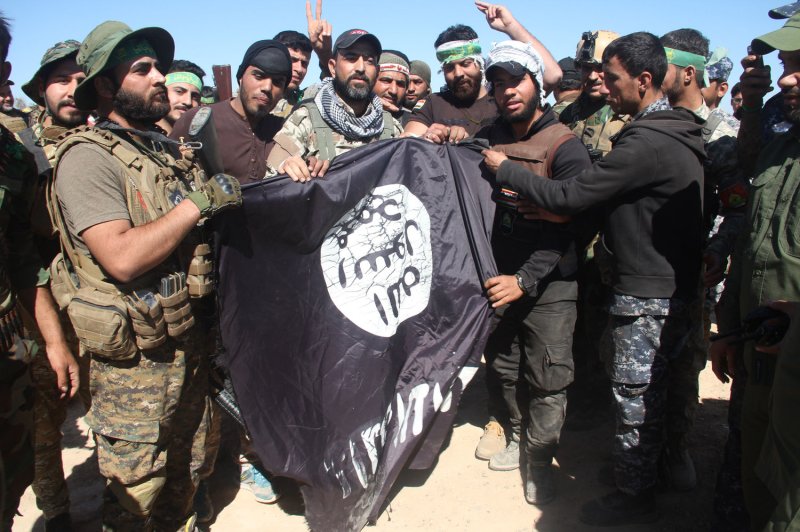Iraqi soldiers show off a flag taken from Islamic State fighters near the city of Fallujah in June 2016, during an operation to regain control of the area from militants. File Photo by Karrar Hazem /UPI |
License Photo
The United States and its allies must develop a clear strategy to win the fight against the Islamic State and strong economic and political support to prevent continuing chaos in Iraq and Syria, foreign policy experts told an audience on Capitol Hill.
The discussion came Friday, just days after Iraqi Prime Minister Haider al-Abadi declared victory against the Sunni terror network known as ISIS in Mosul, the largest city the group held at one time and Iraq's second largest metro area.
Experts said the outlook for the future of Iraq is significantly better than it is for Syria because Baghdad has legitimate government institutions, relations with major world and regional powers and significant oil resources. Syria, though, has none of those, and has sustained more damage in its major cities than has Iraq.
Paul Salem, vice president of policy analysis at the nonpartisan Middle East Institute, said the struggle for human rights, reasonable government and equal opportunity has been the story of both countries since before the rise of the terror group.
According to Salem, a fight for influence has characterized the region since World War I, and has evolved into a fight for influence between regional actors, with often devastating consequences.
Wa'el Alzayat, former senior policy adviser on Iraq and Syria to former U.N. Ambassador Samantha Power, said major structural problems in the governments of Middle Eastern countries help explain the emergence of the Islamic State.
"From Morocco to Iran, the region lacks basic rights and opportunities for its citizens," Alzayat said.
Without them, he said, another organization would simply replace the Islamic State if it's defeated.
Former U.S. Ambassador to Turkey and Iraq James Jeffrey said the first policymaking step is for the United States to consider what it wants from Iran, and how that would impact nearby Iraq and Syria. The experts agreed that Iran is a major destabilizing influence in the region -- especially for those two neighboring countries.
"We should expect that these regional states are going to continue to take advantage of this opportunity of these weak states that are highly fragmented," Denise Natali, a Georgetown professor and former USAID worker in Iraq, said.
Despite the fragmentation, Natali rejected the idea that Iraq and Syria each would split into independent ethnic regions. For instance, some have said Iraq could break into smaller ethnic regions populated with Sunni, Shiite and Kurdish peoples.
Natali, though, argued that scenario is unlikely.
"There is ethno-sectarianism, but that's not the way these countries are moving forward," she said, adding that the ethnic groups have become so internally fragmented that they are not cohesive, and must depend upon the government because they are landlocked.















